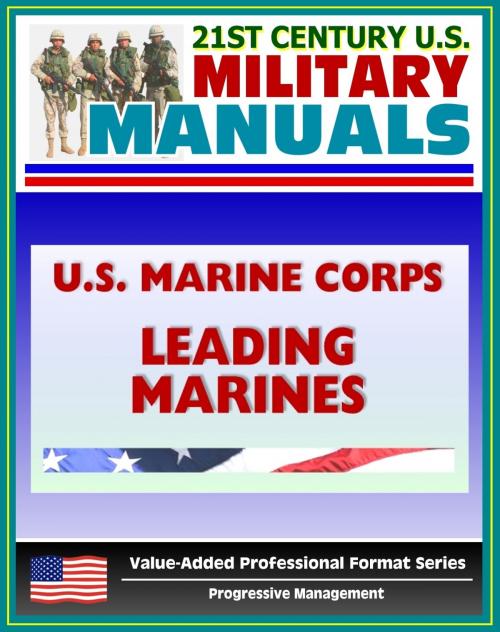21st Century U.S. Military Manuals: U.S. Marine Corps (USMC) Leading Marines - Marine Corps Warfighting Publication (MCWP) 6-11
Nonfiction, History, Military, Naval| Author: | Progressive Management | ISBN: | 9781466191082 |
| Publisher: | Progressive Management | Publication: | February 20, 2012 |
| Imprint: | Smashwords Edition | Language: | English |
| Author: | Progressive Management |
| ISBN: | 9781466191082 |
| Publisher: | Progressive Management |
| Publication: | February 20, 2012 |
| Imprint: | Smashwords Edition |
| Language: | English |
Part of our value-added professional format series of U.S. military manuals, this U.S. Marine Corps manual describes a leadership philosophy that reflects our traditional strengths as an institution and attempts to define the very ethos of being a Marine. It is about the inseparable relationship between the leader and the led, and is as much about the individual Marine—the bedrock upon which our Corps is built—as it is about any leader. There is less a line between the leader and the led than a bond. It is also about the Corps; about that unspoken feeling among Marines that is more than tradition or the cut of the uniform. It flows from the common but unique forge from which Marines come, and it is about the indefinable spirit that forms the character of our Corps. It draws from the shared experiences of danger, violence, the adrenaline of combat, and the proximity to death. All of this is based upon certain fundamental traits and principles of leading. Marines are not born knowing them, but must learn what they are and what they represent.
When teaching Marines, we have always drawn from a wealth of material that lies in our heritage and in our traditions. To capture some of that legacy, this manual begins with a chapter on our ethos, a chapter that attempts to identify just what it is that makes Marines. Being a Marine, after all, is different, and, therefore, leading Marines is different from leading in any other walk of life. It must be different because of who and what we are and what we do. It is different because of the character of our Corps—a character that lies at the very foundation of individual camaraderie, unit cohesion, and combat effectiveness. It is this character—our ethos—that gives Marines the pride, confidence, and hardness necessary to win.
Winning means victory in daily life as well as in combat. If a Marine fails to uphold our standards and dishonors oneself or our Corps in peacetime by failing to support fellow Marines, by failing to do his or her best to accomplish the task at hand, or by failing to follow ethical standards in daily life, how can we expect that same Marine to uphold these critical foundations of our Corps in the searing cauldron of combat?
Thus, the most fundamental element of leading Marines is to understand what it is to be a Marine, and it is on this understanding that we begin.
As a bonus, this reproduction includes the Marine Corps Manual, the basic publication of the United States Marine Corps issued by the Commandant of the Marine Corps and approved by the Secretary of the Navy - sold separately for $7.99. It is a regulatory publication for the Department of the Navy as defined in U.S. Navy Regulations. The Marine Corps Manual is designed primarily for use by Marine Corps commanders and their staffs, Navy officers exercising command over Marines, the staff of the Commandant of the Marine Corps, and the staffs of the bureaus and offices of the Navy Department. Contents: Chapter 1 - General Administration And Management * Chapter 2 - Manpower * Chapter 3 - Operations And Readiness * Chapter 4 - Logistics
Part of our value-added professional format series of U.S. military manuals, this U.S. Marine Corps manual describes a leadership philosophy that reflects our traditional strengths as an institution and attempts to define the very ethos of being a Marine. It is about the inseparable relationship between the leader and the led, and is as much about the individual Marine—the bedrock upon which our Corps is built—as it is about any leader. There is less a line between the leader and the led than a bond. It is also about the Corps; about that unspoken feeling among Marines that is more than tradition or the cut of the uniform. It flows from the common but unique forge from which Marines come, and it is about the indefinable spirit that forms the character of our Corps. It draws from the shared experiences of danger, violence, the adrenaline of combat, and the proximity to death. All of this is based upon certain fundamental traits and principles of leading. Marines are not born knowing them, but must learn what they are and what they represent.
When teaching Marines, we have always drawn from a wealth of material that lies in our heritage and in our traditions. To capture some of that legacy, this manual begins with a chapter on our ethos, a chapter that attempts to identify just what it is that makes Marines. Being a Marine, after all, is different, and, therefore, leading Marines is different from leading in any other walk of life. It must be different because of who and what we are and what we do. It is different because of the character of our Corps—a character that lies at the very foundation of individual camaraderie, unit cohesion, and combat effectiveness. It is this character—our ethos—that gives Marines the pride, confidence, and hardness necessary to win.
Winning means victory in daily life as well as in combat. If a Marine fails to uphold our standards and dishonors oneself or our Corps in peacetime by failing to support fellow Marines, by failing to do his or her best to accomplish the task at hand, or by failing to follow ethical standards in daily life, how can we expect that same Marine to uphold these critical foundations of our Corps in the searing cauldron of combat?
Thus, the most fundamental element of leading Marines is to understand what it is to be a Marine, and it is on this understanding that we begin.
As a bonus, this reproduction includes the Marine Corps Manual, the basic publication of the United States Marine Corps issued by the Commandant of the Marine Corps and approved by the Secretary of the Navy - sold separately for $7.99. It is a regulatory publication for the Department of the Navy as defined in U.S. Navy Regulations. The Marine Corps Manual is designed primarily for use by Marine Corps commanders and their staffs, Navy officers exercising command over Marines, the staff of the Commandant of the Marine Corps, and the staffs of the bureaus and offices of the Navy Department. Contents: Chapter 1 - General Administration And Management * Chapter 2 - Manpower * Chapter 3 - Operations And Readiness * Chapter 4 - Logistics















